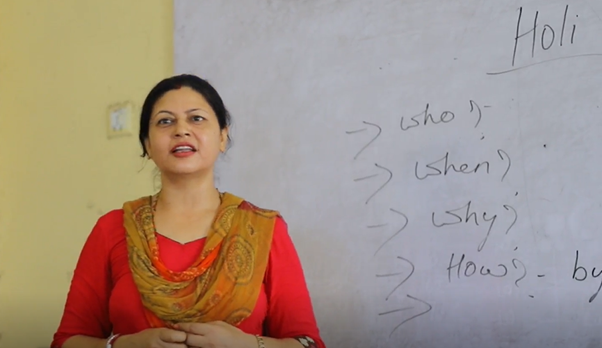OER 2 Using all languages for learning
1.2 EMEGen research
Depending on what is permitted in their context, teachers mix languages informally and spontaneously in the classroom. Teachers do this in order to help students and support their learning, as this teacher and student in different parts of the world explain:
Whenever I don’t understand [an English] lesson and I ask the teacher, he explains to me in a way I will understand in simple English, or especially in Hausa.
(Female student, Hausa medium school)
If other things are taught in English, they can forget, but the concept is clear when taught in Nepali.
(Female teacher, Nepali medium school)
(EMEGen research in Nigeria)
Note: All quotes are taken from interview data generated in the EMEGen research in Nigeria, where Hausa is the language of instruction in Hausa medium schools, and in Nepal, where Nepali is the language of instruction in Nepali medium schools.
Teachers make ‘in the moment’ decisions about which language to use. Sometimes teachers switch languages to help individual students, or groups of students.
Teachers also deliberately plan to use different languages in lessons, if this is permitted in their context. For example, teachers:
- write on the board in English and in the local language
- lecture in English and repeat in the local language
- write on the board in English and lecture in the local language.


These informal and formal practices are helpful to students who experience comprehension difficulties due to the language of school instruction.
Many students experience this, for example, 87% of Nigerian students in the EMEGen research reported comprehension difficulties in the language of instruction. This difficulty was consistent for all students – boys and girls, in English medium schools and in local language medium schools. In Nepal, over 50% of girls and boys surveyed believe that all students face challenges learning through English, and they also reported comprehension difficulties in the national medium of education.
For students who do not have English or the national language as the one they are most familiar with, there are severe learning barriers, because they do not have an educational pathway that uses their mother tongue. For instance, in Nepal, many students do not have Nepali as their first language but another language such as Bhojpuri, Bajjika, Hindi or Maitheli, as this teacher notes:
Children won’t understand if I say it in English, not even in Nepali sometimes. In that case, it has to be taught in Bhojpuri.
(Teacher, Nepali medium school)
Parents see their children struggle to learn in school, even though English is often considered to be more ‘rewarding’ than national language education:
No matter what, some things will be difficult to her [student], because it [English] is not her mother tongue and most of the time, she speaks her native language.
(Parent of female student in English medium education, Nigeria)
The nursery and primary schools she attended were EME [English Medium Education] schools and we have seen how hard she struggled to learn the language of instruction and to understand the lesson taught, as well.
(Parent of male student in Hausa medium education, Nigeria)
But students value their different languages, and plan to use all their languages in the future.
I like Nepali-medium as I have been studying in it since my basic level. It is easy to understand in Nepali-medium.
(Female student, Nepali medium education)
The two languages (Hausa and English) would help me in communicating with my patients after I have become a medical doctor. I can use English to speak to those that cannot understand Hausa.
(Male student, English medium school, Nigeria)
English and Hausa have roles to play in my future ambition. English is used to teach me in school, but I use Hausa to communicate with everyone outside the school, because everyone here understands Hausa.
(Female student, English medium school Nigeria)
With the EMEGen research in mind, now go to your activities.
